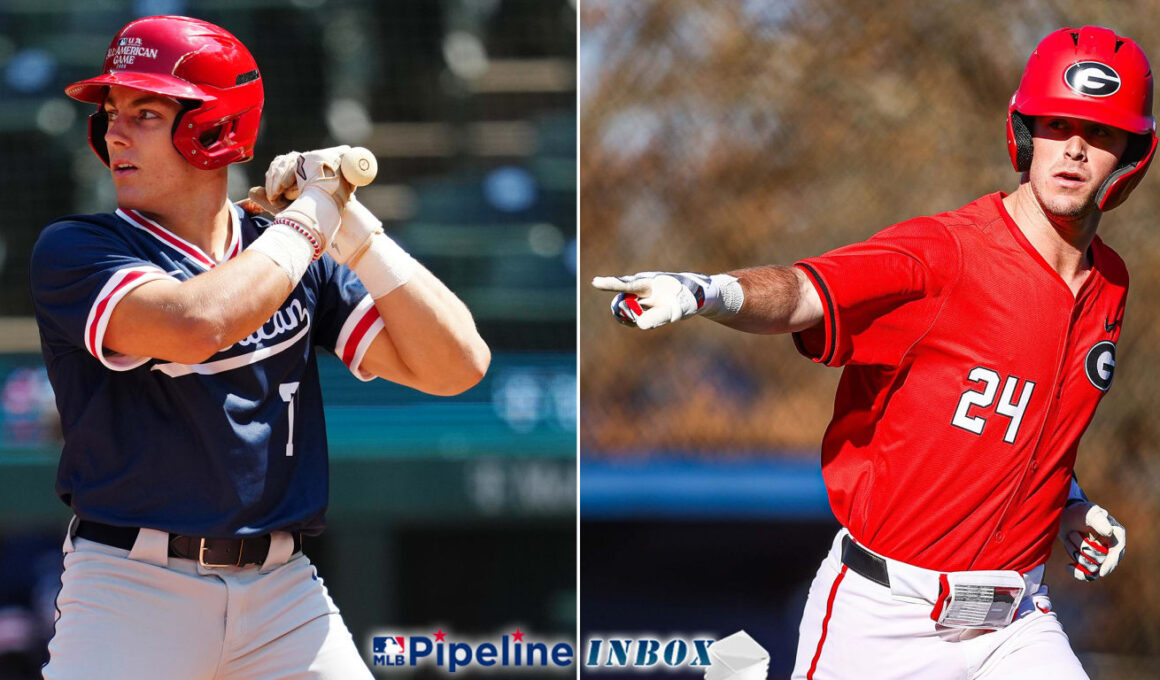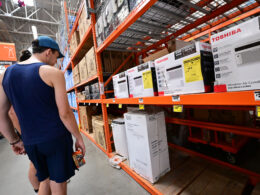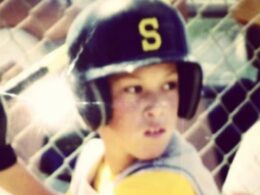Inbox: D-backs maxing out bonus pool, where Condon fits with Rox
While we had a minute to catch our breath after the Futures Game-Draft combo platter that is the All-Star break for us at MLB Pipeline, there’s no rest for the weary. The Trade Deadline (July 30, 6 p.m. ET) and the Draft signing deadline (August 1, 5 p.m. ET) are keeping us plenty busy, as is the work we’re doing behind the scenes to update all 30 team Top 30 lists (and the Top 100, of course) to include all these new draftees.
More from MLB Pipeline:
• Top 100 prospects | Stats | Video | Podcast | Complete coverage
But we (almost) always have time for your questions! This week’s MLB Pipeline Inbox is mostly Draft-related, but I snuck in a question about Minor League prospects that we answered in this week’s Pipeline Podcast.
My D-backs have spent quite a bit more on some Draft picks than their slot value and under slot for others. That said, I worry they are cutting it close to their spending limit. What is the max you can go over your total draft budget and not be penalized? What are the penalties? — @jmcdearmont01
I wanted to use this question to give a primer on the how the system works. But first, let me look at the D-backs’ spending more closely.
As of this writing, the only player who is yet to sign who will really impact the club’s bonus pool is first-rounder Slade Caldwell (I’m confident he will sign by the deadline). They’ve gone over slot to sign Tytus Cissell (fourth round), Connor Foley (fifth round) and Bo Walker (11th round). On the flip side, they’ve gone under slot on every other pick in the top 10 rounds except Ryan Waldschmidt, who got exactly pick value at No. 31 overall. In total, they’ve spent $9,575,000 of their total pool of spending ($9,616,500, had they given everyone exactly slot value), so they’re actually $41,500 under.
Now I’ll use the D-backs to explain the system. The pick value for Caldwell (No. 29 overall) is $3,045,500, but it’s not quite as simple as them only being able to go up to $3,087,000 (the pick value plus that $41,500 they’ve saved). Teams are allowed to go over their bonus pool, albeit with penalties. A club can go up to five percent over their bonus pool, paying a 75-percent tax on the overage. Anything over five percent would result in the loss of Draft picks (a first-rounder over five percent, up to 10 percent, along with that 75-percent tax; a first and second-round pick if over 10 percent up to 15 percent, along with a tax of 100 percent; two first-round selections and a 100 percent tax for anything over 15 percent). It’s important to note that no team has gone over five percent and had to forfeit a Draft pick since this system was instituted.
Where does that leave the D-backs as it pertains to their bonus pool? If they wanted to not go over at all and avoid any kind of monetary penalty, then that $3,087,000 mark would be the limit for Caldwell. If they are willing to shoulder the 75-percent tax, that would lift their overall limit to $13,295,100 (initial bonus pool of $12,662,000 + five percent of that pool, which is $633,100). That means they could get up to $3,720,100 to sign Caldwell without incurring the loss of a Draft pick.
Do you believe Charlie Condon will be a 3B or OF long-term for his career? — @StevieDAles97
Condon, the No. 3 overall pick in the Draft and signed by the Rockies for a record-tying bonus of $9.25 million (tied with No. 2 pick Chase Burns), has a ton of offensive potential. I know, I’m going out on a limb after his .433/.4556/1.009 season at Georgia this year. All he did was lead all Division I hitters in batting average, slugging percentage and home runs (37). But where he’ll be penciled into a big league lineup defensively remains in question.
The good news is that he showed enough acumen this season to believe he’s going to be a capable defender, while previously there may have been concern that he’d end up a DH or a stiff first base type. He was more athletic than anticipated, playing all three outfield spots — including a lot of time in center — as well as third base for the Bulldogs. But while he has above-average arm strength that plays at the hot corner, his lack of foot speed and his size (6-foot-6) make it unlikely that he can man the hot corner at the next level. He was announced as an outfielder when he was drafted, and that’s the best spot for him. Put him in a corner and let his bat carry him to Coors Field in a hurry.
Ignoring the prep kids who pulled out of the Draft, are there any players who went undrafted that you thought for sure would be picked? The Jared Jones types who will end up back at school another year. — @AaronJSomers
Jones was a Draft-eligible sophomore out of LSU who we had at No. 119 overall on our Top 250. There weren’t too many other college players who fit that description, though we felt Virginia outfielder Harrison Didawick ( No. 125), Missouri State outfielder Zack Stewart ( No. 134) and TCU shortstop Anthony Silva ( No. 137) were all eligible sophomores we thought had a good chance to get taken and weren’t.
We didn’t know the exact bonus expectations for some of the top high school players who went unselected, but we knew many of them had high figures in mind and if we didn’t hear their names called early in Round 2, we had a feeling then that they might go on to school (Trey Gregory-Alford going in Round 11 and getting seven figures from the Angels is an exception to that rule). No. 56 prospect Dax Whitney, from Idaho, is the top prep pitcher in this group and he could have gone in the top two rounds, but teams didn’t want to meet his asking price, so he’ll head to Oregon State. I actually thought Florida prep outfielder/pitcher Noah Franco was going to get taken on Day 2, but when that ship sailed, he likely started making plans to head to TCU.
Are there any prospects who could have a major impact in the playoffs? — @Blahbla92342524
This was the question we tackled on the Podcast this week, so check that out for more details. We decided to define this as anyone who was still officially a prospect as of right now, even if they’re in the big leagues. So, no, Paul Skenes doesn’t qualify. Among the players we mentioned, in order of our current Top 100:
Jackson Holliday, Orioles
Junior Caminero, Rays
Jordan Lawlar, D-backs
Brooks Lee, Twins
Jasson Domínguez, Yankees
Tyler Black, Brewers









